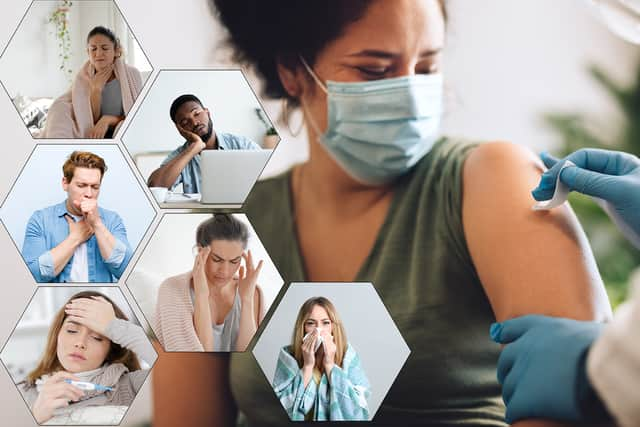8 key Omicron Covid symptoms affecting fully vaccinated - earliest warning signs of infection to look for
and live on Freeview channel 276
Covid infections in the UK appear to be levelling off after reaching record highs last week, figures from the Office for National Statistics (ONS) show.
In England, around one in 13 people were estimated to have had coronavirus in the week to 2 April, or 4.1 million people, which is unchanged from the week to 26 March.
Advertisement
Hide AdAdvertisement
Hide AdIn Wales, the estimate is up from one in 14 people to one in 13, while in Scotland, 396,800 people were estimated to have had the virus in the same period, or around one in 13, down from one in 12 the previous week.
In Northern Ireland, the ONS described the trend as “uncertain”, with one in 16 people infected, down from one in 15.
The recent high rates are thought to have been driven by the increased level of social mixing since Covid restrictions eased, as well as the highly infectious BA.2 sub-variant of Omicron which is now dominant across the globe.


What symptoms should vaccinated people look for?
Researchers in Norway have identified key Omicron symptoms that are most common among people who are fully vaccinated which could help detect infection.
Advertisement
Hide AdAdvertisement
Hide AdThe team interviewed 111 out of 117 party guests who had attended an event where there was a Covid outbreak, 89% of which had received two doses of a coronavirus vaccine. Of the group interviewed, 66 had definitive cases of Covid and 15 had possible cases of the virus, and none had received a booster dose.
The findings, published in medical journal Eurosurveillance, said there were eight key symptoms presenting in those who had been double jabbed. These include:
- Cough
- Runny nose
- Fatigue
- Sore throat
- Headache
- Muscle pain
- Fever
- Sneezing
A cough, runny nose and fatigue were identified as the most common symptoms in people who were fully vaccinated, while a fever and sneezing were the least common.
As all of the symptoms listed are very similar to those caused by a cold or flu, it can be difficult to tell if the illness is coronavirus. As such, current government guidance recommends that people stay at home and avoid contact with others if they have Covid symptoms and either:
- a high temperature, or
- or do not feel well enough to go to work or do normal activities
Advertisement
Hide AdAdvertisement
Hide AdVaccines protect against the most serious risks of coronavirus, but it is still possible to contract Covid even if you have had two doses, plus a booster.
What early warning signs should I look for?
Data from the ZOE Covid Study has identified two telltale signs of infection that could be an early indication of infection from the Omicron strain.
Dizziness or fainting has been found to be prominent among those infected with the BA.2 sub-variant, also known as ‘Stealth Omicron’, and this may come and go throughout the day.
Another common early symptom is fatigue, which can lead to body pains, weak or aching muscles, headaches and loss of appetite.
Stealth Omicron symptoms are also thought to manifest more quickly than previous strains and can appear within two days of being infected rather than four.
Comment Guidelines
National World encourages reader discussion on our stories. User feedback, insights and back-and-forth exchanges add a rich layer of context to reporting. Please review our Community Guidelines before commenting.
